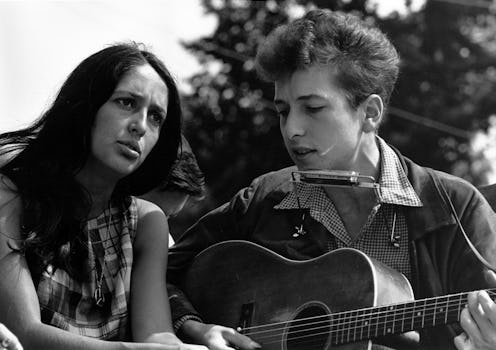
A couple days ago, I was walking my dog when a car blasting Coolio's "Gangsta's Paradise" drove by. It was impossible for me not to run through the lyrics in my mind. After all, as a kid growing up in the '90s, that song was everything: #1 hit and theme song for the film Dangerous Minds. More specifically, it was my first introduction to the trope of old people using a song lyrics as a way to connect with or teach literature to the youth. As an adult, it prompted me to ask a strange sort of question: are song lyrics literature? This question is especially relevant now that singer/songwriter Bob Dylan has won the Nobel Prize in Literature.
Music could be a conduit to literature, rhythm, words — true enough, Coolio suggested — but, according to many a writing teacher I've known, the two art forms remain apples and oranges: sure you can fit both fruits in your pocket, but one's skin is palatable and the other's ... isn't. There was the bearded poetry teacher in high school who told our workshop that Jim Morrison ripped off Shakespeare. There was the young prosody professor in college who encouraged people to scan Mos Def lyrics — but would've decimated anything someone submitted to workshop that approximated rap.
The argument that lyrics aren't literature seems predicated on ideas of medium that are quickly falling away. ENG 101 tells us that the earliest poems and epics were sung, recited or performed, designed to entertain or honor the state. Only with the advent of printed word could there be a distinction between what was read and what was heard.
The argument that lyrics aren't literature seems predicated on ideas of medium that are quickly falling away. ENG 101 tells us that the earliest poems and epics were sung, recited or performed, designed to entertain or honor the state.
Today, most of us conceive of reading broadly. (You can thank your ENG 101 teacher for that.) Reading is interpreting, analyzing, forming connections, and richly imagining. You can read a book or a poem — or a television show or a trend in a fashion show (one need only think of the recent Marc Jacobs' appropriation controversy to know as much is true). And, of course, you can read song lyrics.
People speculating about who would snag the Nobel Prize for Literature probably weren't thinking about Bob Dylan, but the songwriter-poet's win represents a major turning point in our cultural conceptualization of genre. To honor Dylan is to acknowledge the arbitrariness of distinctions between literature on the page... and literature set to music.
Most of us can recite more songs than poems. It doesn't matter that "Red Shift" by Ted Berrigan brings me to goosebumpy tears every time I read it: it's not burrowed into my gray matter like, say, "Bye Bye Bye."
To honor Dylan is to acknowledge the arbitrariness of distinctions between literature on the page... and literature set to music.
That's not to equate N*Sync with Bob Dylan, whose lyrics would give any writer (of fiction, poetry, film, TV, you name it) serious envy. Dylan is wholly deserving of the Nobel, and his win will inspire budding writers (and aging teachers) to break through the superficialities of genre.
Images: Wikimedia Commons/Rowland Scherman